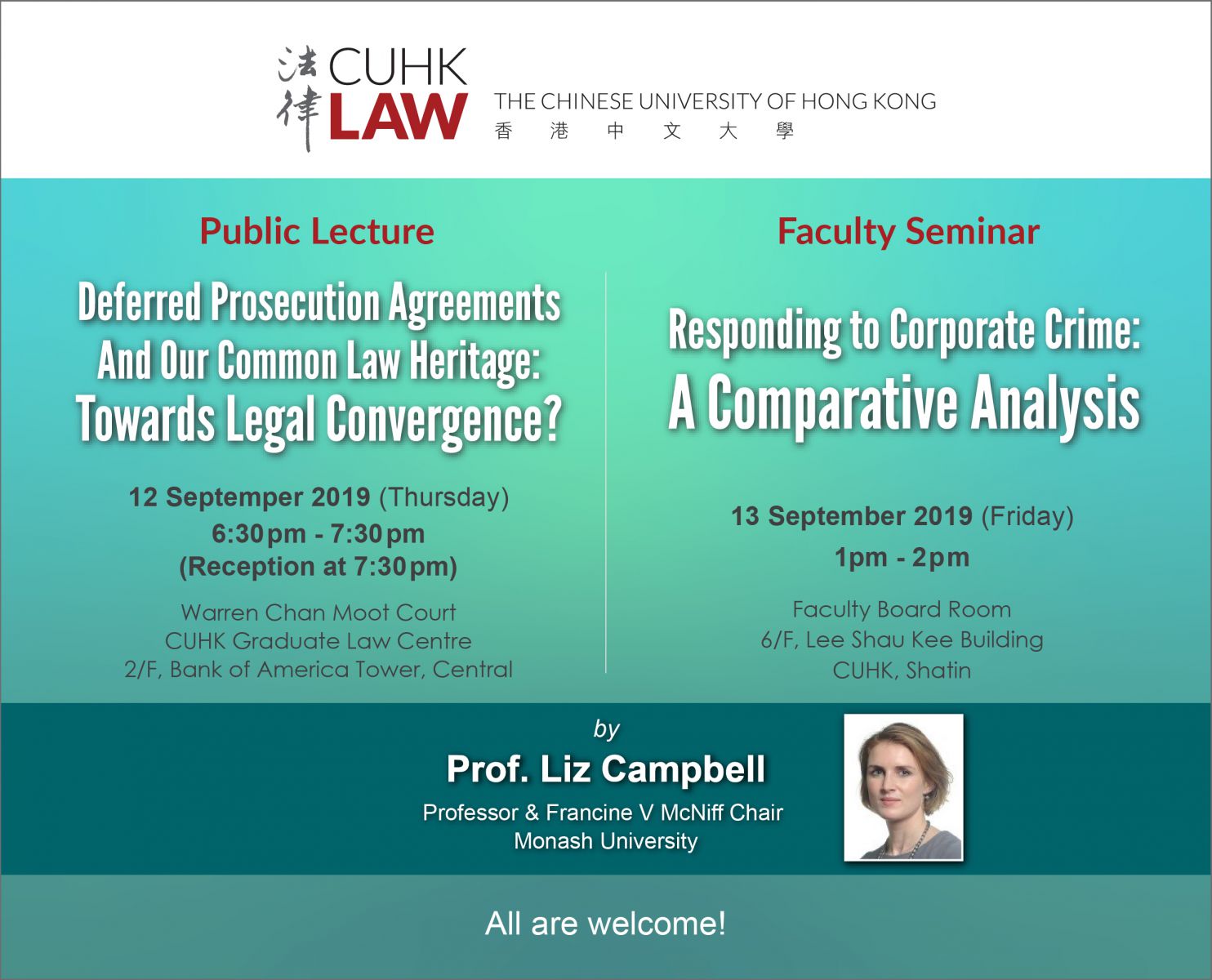Events
Public Lecture – Deferred prosecution agreements and our common law heritage: Towards legal convergence? (12 Sep); Faculty Seminar – Responding to corporate crime: a comparative analysis (13 Sep) by Prof. Liz Campbell
12 September, 2019
The Public Lecture and Faculty Seminar are cancelled.
Public Lecture: Deferred prosecution agreements and our common law heritage: Towards legal convergence?
Date & Time: 12 September 2019 (Thu), 6:30pm – 7:30pm (Reception at 7:30pm)
Venue: Warren Chan Moot Court, CUHK Graduate Law Centre, 2/F, Bank of America Tower, Central
Corporate wrongdoing poses difficulties, if not intractable problems, for the criminal justice process, in terms of investigation, evidence and punishment. A growing number of jurisdictions now permit deferred prosecution agreements (DPAs) or other non-trial resolutions (NTRs) to be negotiated with corporations, entailing suspension of prosecution as long as certain specified conditions are met. Though not uncontroversial, DPAs are seen as a pragmatic response to difficulties in pursuing corporate crime, given the evidential burdens that must be surmounted, and the risk and resource involved in prosecution.
Much has been made of the differences between DPAs as developed initially and applied in the United States and their subsequent iterations globally (see e.g. the schemes in England and Wales, France, Canada, and forthcoming in Ireland and Australia). Less attention has been paid to the fact that these domestic mechanisms have gained traction in both common and civil law contexts, albeit in more moderate and formalized configurations. This lecture seeks to examine how DPAs have been defined, developed, and deployed in different jurisdictions, in an effort to identify the extent to which this is shaped by the dominant model of criminal procedure (Damaska, 1973) in a given country. Although the classification of models of criminal process is complex and contested, it is still a novel and valuable lens through which to ascertain the operation and impact of DPAs and other NTRs. This lecture examines whether their adoption is indicative of an organic convergence in the response to transnational white-collar and corporate crime (Freiberg, 2011).
Faculty Seminar: Responding to corporate crime: a comparative analysis
Date & Time: 13 September 2019 (Fri), 1:00pm – 2:00pm
Venue: Faculty Board Room, 6/F, Lee Shau Kee Building, CUHK, Shatin
Defining and prosecuting corporate criminality has long been fraught with difficulty. As a result, numerous jurisdictions (like the UK, France, and soon Australia, to name just a few) are seeking to improve outcomes through the introduction of an innovative suite of measures that centres on compliance, negotiation, and settlement, albeit in a criminal law guise.
Two such mechanisms are the use of omissions liability against corporate actors, that is, the criminalization of failure to prevent certain crimes or failure to enact anti-corruption provisions, as well as deferred prosecution agreements, which circumvent the conventional criminal trial.
This seminar discusses the development of omissions corporate liability, and its counterpart, the deferred prosecution agreement. It uses the UK as a case study to examine how these provisions were enacted and then have been applied in practice, mapping and assessing all of the relevant cases to date. Both measures were introduced in the UK to remedy concerns with the orthodox method of ascribing criminal liability to corporate actors through the “identification doctrine”. While these initiatives may be regarded as pragmatically valuable, and are being emulated in other jurisdictions, their impact remains predicated on and challenged by this fundamental and problematic doctrine.
About the speaker:
Prof. Liz Campbell is the inaugural Francine V McNiff Chair in Criminal Jurisprudence at Monash University (Melbourne, Australia) having previously been Professor of Criminal Law at Durham University (UK).
Prof. Campbell’s research focuses primarily on how the criminal law is deployed to address sophisticated, profit-driven crime, both by otherwise legitimate corporate entities as well as networks of organised crime. Another strand of her research looks at the use of biometrics in investigation and prosecution, and she is a member of the UK Home Office Biometrics and Forensics Ethics Group. Her research has been funded by the Research Council UK’s Partnership for Conflict, Crime and Security, the UK’s Arts and Humanities Research Council, the Law Foundation of New Zealand, the Fulbright Commission, the Modern Law Review, and the Carnegie Trust.
